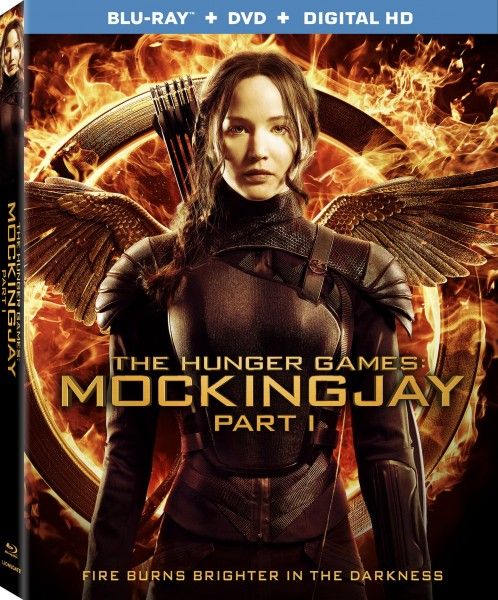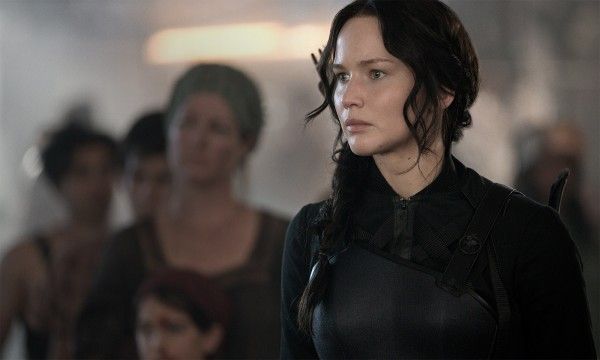Between the theatrical run on The Hunger Games: Mockingjay - Part 1 and this new Blu-ray release, I did something I haven’t done before: read the three Hunger Game novels on which this monster of a franchise is based. I did it mainly to find out how it all ends (what can I say? They hooked me) but it had the added benefit of showing me just how brilliantly they’ve adapted this world to movie screens. So many details lie quietly in the background that fans of the book could spot instantly, but that the rest of us might easily dismiss as an incidental flourish. That reverence helps explain why this series has done so well, and why the first half of its ultimate chapter proves so pleasing despite forcing us to wait for a year to find out how it all comes out.
Indeed, the only real problem with Mockingjay - Part 1 is that it devotes itself entirely to setting things up. We don’t get any payoff for its story (that’s coming in November), and have to satisfy ourselves with unanswered questions that linger painfully over the closing credits. On the other hand, the journey there is so full of cool juicy details that a little wait for the remainder looks like a small price to pay.
Central to this is the fact that we’re finally out of the Hunger Games arena – where tributes in Suzanne Collins’ dark future battle to the death for the amusement of indifferent rulers – and into a full-bore revolution. Spurred by the plucky Katniss Everdeen (Jennifer Lawrence), the populace is fighting back, centered on a hidden base beneath the long-thought-dead District 13 and aimed at toppling the sinister regime of President Snow (Donald Sutherland). Snow instigated the whole thing by treating Katniss like a threat she never wanted to be, and now Katniss finds herself hunkered down in District 13 while the bombs fly.
The revolt-against-pseudo-fascist-oppressors thing has been done to death, but Mockingjay has much more on its mind than that just Good Guys vs. Bad Guys. Collins was keenly interested in media distortions of reality, the power of propaganda, and how the ostensibly powerless can change the world simply by looking good on television. Katniss serves as a rallying point for the revolution, and the rebel government wants her to be their spokesperson. They do this by putting her in combat zones, waiting for her to find the spontaneous defiance that inspired so many when she was in the arena, and broadcasting the results. Katniss is keenly aware of their manipulation – little different than Snow’s – but she has goals of her own, and acting as a mouthpiece will help her get them. The people she cares about may live or die based on how well she does her job, forcing her to play a game she really has no interest in.
It makes for sterling drama, aided by Collins’ keen understanding of the media and the way her post-apocalyptic universe resembles the omnipresent cultural echo chamber of the present day. A ridiculously good cast bolsters those conceits, led by a trio of Oscar winners (Lawrence, Julianne Moore and Philip Seymour Hoffman in one of his final roles) and maintained by supporting players tailor made for their roles. Woody Harrelson continues to stand out as Katniss’s alcoholic mentor, and Elizabeth Banks makes a surprising turn as dressed down fashion maven Effie Trinket. We get our share of action in between it all, but that’s not the point of the film and no one sees explosions or gunfights as the purpose of the exercise. Indeed, the big set pieces remain largely off-screen, while Katniss struggles with her own potential and finds ways to defy those who seek to control her.
Director Francis Lawrence – who helmed the second Hunger Games movie and will finish with Mockingjay, Part 2 later this year – keeps the pacing lively without skimping on any of the world’s details. Under his eye, the art director, set director and costumes designers perfectly realize Collins’ universe… then step aside and just let it exist instead of explaining every little corner ad nauseum. That becomes a key part of the film’s appeal: we sense and embrace the richness on display, then focus on the larger message instead of trying to understand how it all works. The universe becomes secondary; it’s the characters who attract us. That simple equation is part of why The Hunger Games remains a dominant franchise in a marketplace saturated with them. Mockingjay, Part 1 continues that formidable tradition: retaining the potency and resonance of the source novel while reminding us that some monster hits fully deserve their status.
Lionsgate never skimps on their Blu-ray releases for The Hunger Games series, and Mockingjay is no different. An eight-part documentary accompanies the main feature, full of countless fascinating details that fans will eat up with a spoon. A smaller featurette pays tribute to Hoffman, while a third focuses on pop star Lorde and her contributions to the soundtrack. A music video from Lorde rounds out the set, along with deleted scenes and a reliable audio commentary from Lawrence and Jacobson. Audio and video qualities are top-notch, of course: indicative of the series’ current status as Lionsgate’s flagship.



